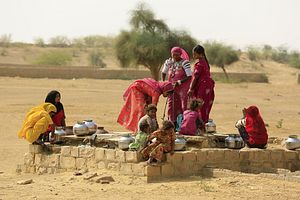India is in a peculiar position today. Not in terms of “harnessing its demographic dividend” – as an economist might put it, given that more than half of the country’s population is below the age of 25 – but in terms of its memory and future. Its under 25 population has no direct memory of the Emergency or the Bhopal Disaster, including your correspondent.
The period that has followed those difficult times has been an era of liberalization. A period in which color, choice, growth, income, prosperity and desire have mattered. The search for the new was expected from everything – from technology to governance.
During this liberalizing era, development has come to be seen as the key to progress. People from Narayana Murthy to Narendra Modi are revered as visionaries. People have felt motivated, driven, determined. The move from “imagined communities” to an “imagined future” has been seen as a form of empowerment. But in this vision of the future, nature is taken for granted, part of the background. As long as it looked pretty, no political regime has bothered to talk about it.
Yet we live in a different world today. A world of the Anthropocene, as some are calling this time when nature is unable to self-regulate to completely offset the activities of humans. Development, seen as a way to solve socio-economic problems, has given rise to new sets of socio-geological problems. According to French Philosopher Michel Serres we are living in a world where Earth in its totality is at stake, meaning nature is now emerging from history’s background. Worse, we don’t even have the language to comprehend the transformation that is taking place.
The work of sociologist Ulrich Beck can help us understand the phenomena. He argues that modernization is producing new, man-made risks, among them environmental. For instance, the production and consumption growth model India pursues is producing changes in the ecology. Droughts, desertification, floods, disasters are placing pressure on local population.
According to the UN, 60 million people living in arid zones could migrate by 2020. Rising sea levels will displace millions of people. India may soon be faced not only with its own domestic issues, but also with climate change issues arising in Bangladesh or Maldives.
Stéphane Hallegate, one of the authors of the IPCC report, considers a scenario in Philippe Squarzoni’s graphic novel Climate Changed. It is 2060, and 20 million Bangladeshis have been forced to leave their country and head for India. Can we conceive of the consequences of that? Or take another example, a one meter rise in sea level, which will swallow up 3.7 million acres of arable land on the Ganges plain, forcing residents from Uttar Pradesh, Uttaranchal, and Bihar south into, say, Maharashtra. Could India accommodate this?
Of course, environmental issues extend beyond rising sea levels, and into policies of health, inequality, governance, finance, economics, security, diplomacy, human rights and management. Nature has now been stretched beyond its natural capability to rejuvenate. We are now approaching the threshold beyond which a combination of different variables will have a multiplier effect. This is not considered by economics, which is built around the flawed assumption that natural capital can always be replaced.
Consider the economic objectives of the current regime in India. The government is trying to attract more foreign investment, build up India’s manufacturing sector, and create a China-like growth model, all without consideration of the environmental consequences. Nature, after all, has its own logic.
Can India begin to take account of the damage done to the environment? Not in terms of labeling it an economic externality and taxing it, but as part of a reflexive modernization of the kind sought by Beck and others?
Capitalism encourages an individualistic society. In its pursuit of capitalism, India could simply decide not to talk about the environmental costs, ignoring nature’s logic. But if a capitalist India cannot develop a collective responsibility to nature, cannot make the future a stakeholder in today’s policy, then nature will eventually exact its price. All Indians can hope for is that that day does not come soon.
Gaurav Daga is currently a student of International Affairs at SciencesPo, Paris. He has been a student of Future Studies under Shiv Visvanathan.

































